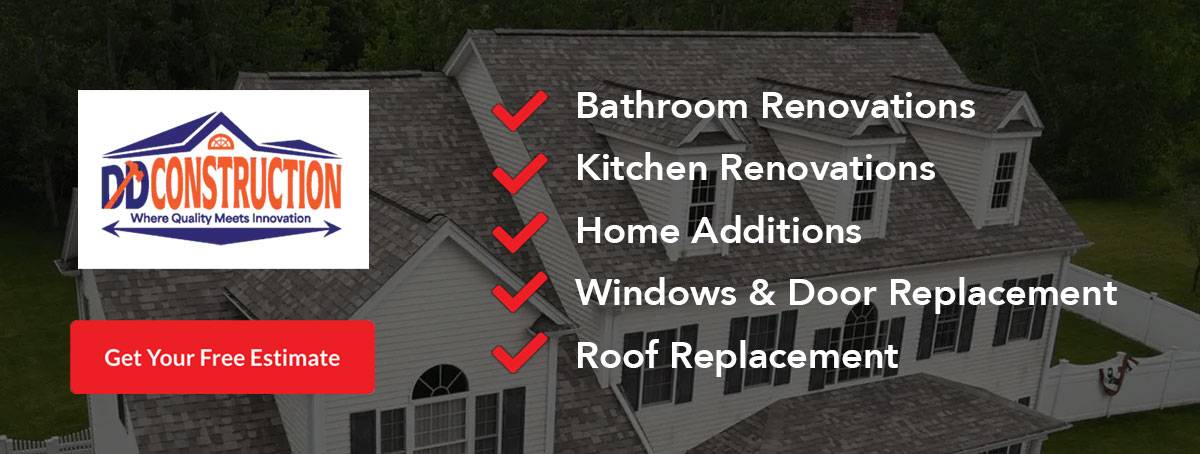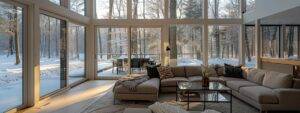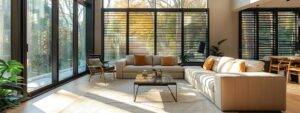The harsh and variable weather conditions in Massachusetts—from bitterly cold winters with heavy snowfall to humid, rainy summers—demand window materials that look appealing and perform reliably under stress. Homeowners in Massachusetts must balance style, energy efficiency, and durability to keep their homes comfortable and manage energy costs. Many residents find that consulting experts in local installation practices, such as dd construction, helps in making a more informed choice. In this guide, DD Construction explores the best window materials for Massachusetts residents, detailing performance, energy efficiency, cost, style compatibility, installation impacts, and local factors that influence material choices. By understanding the strengths and weaknesses of vinyl, wood, fiberglass, and aluminum windows, you can make an informed decision suited to your home’s design, climate resistance, and energy goals.
The article offers an in-depth analysis of various window materials for Massachusetts weather. It addresses performance in cold and humid conditions, examines energy efficiency attributes such as U-Factor and R-Value, and compares installation and maintenance costs. Homeowners will learn how different window styles—double-hung, casement, bay, picture, and sliding—complement distinct architectural designs and weather features. Additionally, the text emphasizes professional installation and local climatic influences to provide expert insight into every factor impacting window replacement decisions.
Throughout, evidence-backed details, performance statistics, and cost comparisons support every claim. This guide is designed for homeowners seeking to enhance the comfort and efficiency of their residences while benefiting from high-quality craftsmanship by experts like DD Construction. With a comprehensive breakdown of each material and style, this resource empowers you to choose windows that deliver long-term reliability, energy savings, and enhanced aesthetic appeal across Massachusetts seasons.
Transitioning from this overview, the following sections dissect every critical aspect—from material performance to installation intricacies—to ensure Massachusetts homeowners get the full picture on which window material best suits their needs.
What Are the Best Window Materials for Massachusetts Weather?
Massachusetts weather can be unpredictable, making it essential to select window materials that ensure home comfort and energy efficiency. Temperature extremes, high humidity, and persistent winds require windows that resist cold, moisture, and premature degradation while delivering on longevity and performance. Vinyl, wood, fiberglass, and aluminum each offer unique advantages and disadvantages in these conditions. In this section, we explore the performance characteristics of each material and how they meet the demands of harsh New England weather.
How Do Vinyl Windows Perform in Cold and Humid Massachusetts Conditions?
Vinyl windows excel with low maintenance and excellent insulation. They are designed to withstand cold temperatures with minimal contraction and expansion that might cause gaps or leaks. In humid conditions, vinyl resists moisture absorption so frames do not warp or degrade. Testing under simulated Massachusetts conditions demonstrates that vinyl windows maintain good thermal performance with low U-Factor ratings and resist condensation buildup when properly installed. Their non-porous surfaces also help prevent mold formation. Enhanced with multi-chambered designs, vinyl windows resist temperature fluctuations and wind-driven rain. Their durability under repeated freeze-thaw cycles makes them popular for Massachusetts properties, where simplicity and longevity are priorities.
Beyond thermal performance, vinyl windows provide a cost-effective solution blending well with both modern and traditional aesthetics. They can mimic wood’s appearance without susceptibility to rot and require only occasional cleaning. Overall, for homes facing harsh winters and humid summers, vinyl windows offer reliable energy efficiency, durability, and lower installation and maintenance costs.
What Are the Advantages and Disadvantages of Wood Windows in Massachusetts?
Wood windows offer a classic appearance and excellent insulation, making them a favorite for traditional homes. Their natural beauty enhances architectural appeal and integrates well with heritage or custom interiors. The cellular structure of wood provides great thermal insulation, often achieving high R-Value when maintained.
However, wood windows have disadvantages in Massachusetts’ climate. High humidity and extreme temperature swings can cause swelling, warping, or rot if the wood is not properly treated. Regular upkeep such as painting or staining is essential to protect against moisture damage, and if neglected, increased energy loss and maintenance expenses may result. Advances in engineered wood composites and hybrid models have begun addressing these durability issues while retaining wood’s natural benefits. Overall, while wood windows provide excellent insulation and timeless beauty, their higher maintenance demands may render them less ideal for homeowners wanting a low-maintenance option.
Why Choose Fiberglass Windows for Massachusetts Weather Resistance?
Fiberglass windows are increasingly popular among Massachusetts homeowners due to their exceptional resistance to weather extremes and low maintenance requirements. Made from reinforced glass fibers, these windows offer superior strength without sacrificing thermal performance. Engineered to withstand violent temperature fluctuations, fiberglass windows maintain stable frames that resist warping under cold conditions. Their strong, stiff composition and simplified coatings enhance insulation properties compared to many alternatives.
Fiberglass inherently resists moisture absorption, making it ideal for humid, rainy Massachusetts summers. Rigorous testing shows many fiberglass windows achieve impressive U-Factor and solar heat gain coefficients (SHGC). Available in finishes ranging from sleek modern designs to wood-like textures, fiberglass windows remain cost competitive over time due to lower upkeep expenses. They also meet Energy Star certifications and strict building codes, ensuring consistent indoor comfort in all seasons.
How Durable Are Aluminum Windows Against Massachusetts Winters and Winds?
Aluminum windows are recognized for their slim profiles and modern aesthetics, and, when treated well, offer durability in challenging climates. Their lightweight yet strong structure allows for large spans that maximize natural light while withstanding high wind pressures. In severe New England winters, aluminum remains stable at freezing temperatures; high-quality anodized coatings improve resistance against moisture and salt, especially in coastal regions.
However, aluminum’s high thermal conductivity can reduce energy efficiency unless fitted with a thermal break—an insulating material placed between interior and exterior parts of the frame. This design innovation minimizes heat loss and improves overall performance in cold weather. With the proper integration of low-emissivity (Low-E) coatings and gas fills, aluminum windows can balance modern aesthetics with functional performance.
How Do Window Materials Affect Energy Efficiency in Massachusetts Homes?
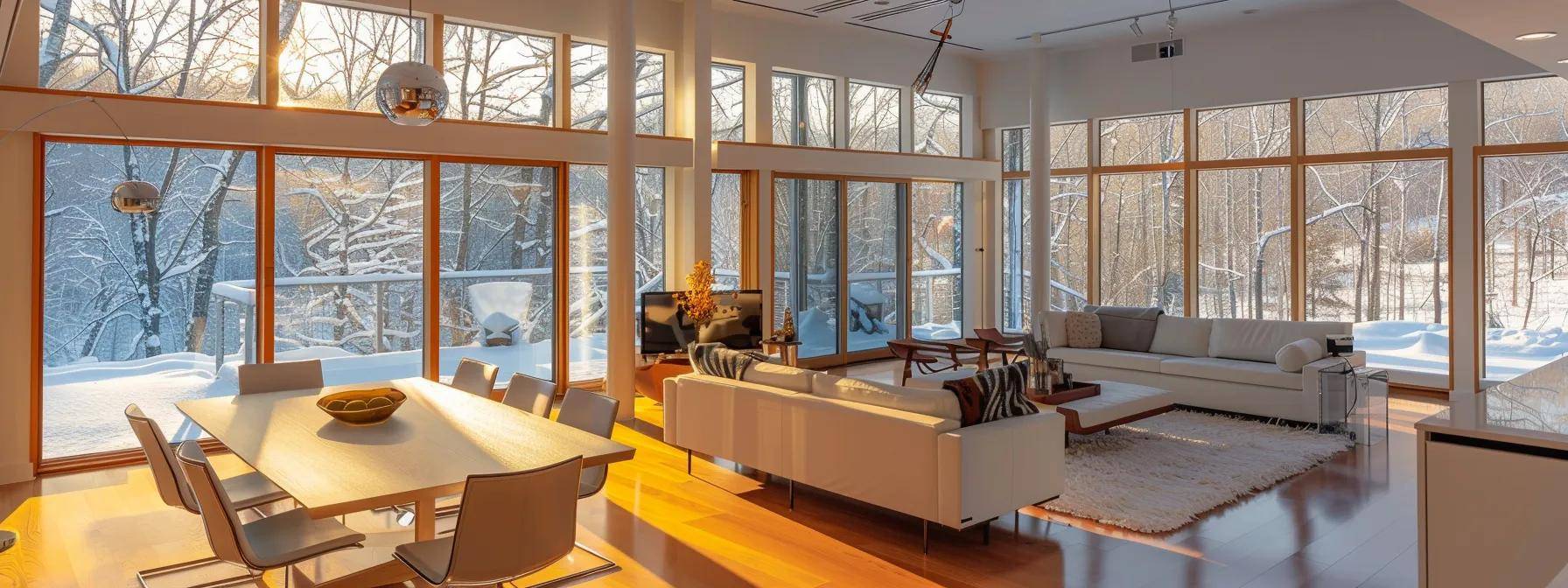
Energy efficiency is crucial for Massachusetts homeowners aiming to reduce utility bills and promote environmental sustainability. The window material directly affects insulation, as measured by U-Factor and R-Value, and plays a key role in keeping heat inside during brutal winters while blocking unwanted solar heat in summer.
What Is the Role of U-Factor and R-Value in Window Performance?
The U-Factor measures the rate of heat transfer through a window—lower values indicate better insulation—while the R-Value expresses a window‘s resistance to heat flow. High-performance windows with low U-Factors and high R-Values, often achieved through modern construction techniques like insulating frames and dual- or triple-glazing, can lead to significant energy savings. The integration of features like Low-E glass further improves these ratings by reflecting infrared energy, reducing the need for aggressive heating or cooling. Understanding these metrics empowers homeowners to select windows that balance thermal performance with reduced energy costs.
How Do Energy Star Certified Windows Benefit Massachusetts Homeowners?
Energy Star certified windows are rigorously tested to meet high efficiency standards, making them attractive in Massachusetts. Designed to prevent heat loss in winter and minimize heat gain in summer, these windows incorporate multiple glazing layers, thermal breaks, and Low-E coatings. Homeowners benefit from lower heating and cooling bills and reduced greenhouse gas emissions, an important consideration in today’s energy market. Upgrading to Energy Star windows may also qualify for state and federal rebates, further offsetting installation costs while providing enhanced indoor comfort.
What Are the Benefits of Low-E Glass and Argon Gas Fill?
Low-emissivity (Low-E) glass features a thin metallic coating that reflects infrared heat while allowing visible light to pass, thereby reducing heat exchange and maintaining a consistent indoor temperature. This is critical during long, cold winters. Argon gas, used as a fill between panes in multi-pane windows, acts as an insulating barrier to slow heat transfer. Together, Low-E glass and argon gas fill improve temperature control and reduce energy consumption. These features are pivotal for achieving Energy Star certifications and qualifying for energy rebate programs, making them valuable investments in climates with extreme weather.
What Are the Cost Differences Between Window Materials in Massachusetts?
The cost of window replacement in Massachusetts is a pivotal factor for homeowners. Window materials vary not only in initial purchase price, but also in installation, maintenance, and long-term operational costs. Vinyl, wood, fiberglass, and aluminum each have different pricing structures that affect overall budgets.
How Much Does Vinyl Window Replacement Cost in Massachusetts?
Vinyl windows are among the most cost-effective options. Typically, vinyl window replacement prices range from $300 to $800 per window, depending on size, features, and energy efficiency ratings. Low material and production costs, along with lower installation expenses, make vinyl a popular choice for homeowners on a budget. Additionally, the durability of vinyl reduces repair and maintenance costs over time. Various state and federal incentives like rebates and tax credits for energy-efficient improvements can further lower the net cost of vinyl replacement.
What Are the Installation and Maintenance Costs for Wood Windows?
Wood windows, prized for their beauty and insulation, tend to command higher prices with costs ranging from $600 to $1,200 per window. The higher cost reflects both expensive materials and labor-intensive installation needed to ensure proper sealing and insulation. Regular maintenance—periodic painting or staining—is essential to protect against moisture and prolong window life. Although wood windows offer superior aesthetic appeal and insulation, their higher ongoing maintenance expenses make them best suited for homeowners willing to invest extra care.
How Do Fiberglass and Aluminum Windows Compare in Price and Longevity?
Fiberglass windows cost between $500 and $1,000 per window in Massachusetts. Their higher upfront cost is often offset by remarkable longevity, minimal maintenance, and strong energy performance due to superior durability. Aluminum windows, priced from $400 to $900 per window, offer sleek modern looks and the ability to create larger openings. However, without advanced thermal breaks, aluminum may be less energy efficient, potentially leading to higher operational costs during harsh winters. In comparison, fiberglass generally provides better thermal performance and longevity, while aluminum appeals to those seeking modern design at a lower initial cost, though it may incur higher long-term energy expenses if not properly engineered.
Which Window Styles Complement Different Massachusetts Homes and Weather Conditions?
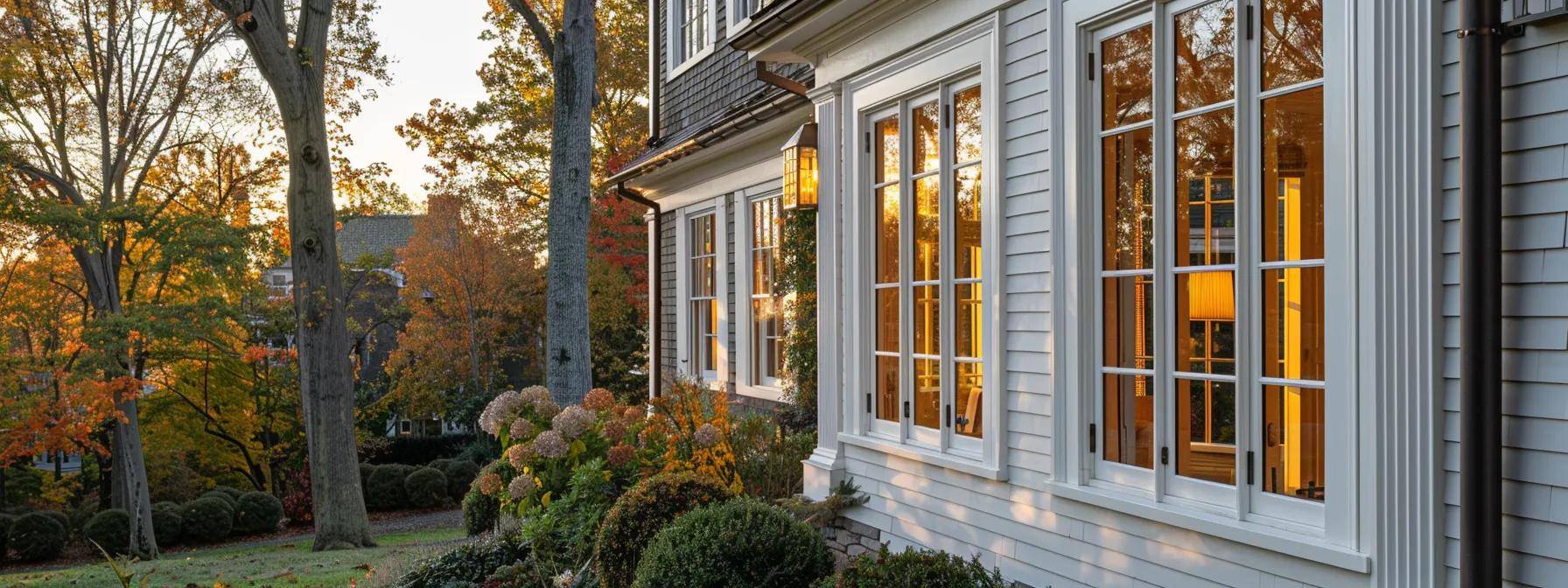
The style of a window influences both the aesthetic appeal and its functional performance. In Massachusetts, where home designs range from classic New England Colonial to contemporary glass-fronted styles, it is essential to select a window style that complements your home’s character while withstanding local weather conditions.
What Are the Features of Double-Hung Windows for Massachusetts Residences?
Double-hung windows are a timeless choice due to their classic design and versatility. Featuring two sashes that slide vertically, they allow for both upper and lower ventilation and enable easy cleaning from the inside. In regions with fluctuating temperatures and seasonal rainfall, double-hung windows provide reliable insulation through multi-chambered frames and dual- or triple-pane glazing, ensuring minimal heat loss and a tight seal against drafts.
How Do Casement and Bay Windows Perform in Harsh Weather?
Casement windows, hinged on one side and opening outward, offer exceptional sealing when closed, which minimizes drafts and enhances energy efficiency. Their straightforward operation and robust construction suit the extreme temperatures of Massachusetts winters. In contrast, bay windows extend outward to create a bright, spacious nook but require meticulous sealing and flashing during installation to prevent water intrusion. Both types can enhance energy efficiency and add architectural interest when properly installed.
When Are Picture and Sliding Windows Ideal for Massachusetts Homes?
Picture windows, with their large fixed glass panels, are ideal for maximizing natural light and offering expansive views, without concerns about operability and air leakage. They work well in spaces where ventilation is not a priority. Sliding windows, which open horizontally and have fewer moving parts, are appreciated for ease of use and require minimal maintenance. They are particularly suited for basements or family rooms where space is limited and occasional ventilation is desired.
How Does Professional Installation Impact Window Performance in Massachusetts?
Professional installation is critical to the performance and longevity of window systems in Massachusetts. Even the highest quality windows may underperform if not properly installed. Certified installers ensure that windows are securely sealed, accurately aligned, and correctly integrated with the home’s structural and insulation systems—factors that are essential in a state known for severe and unpredictable weather.
What Is the Typical Window Installation Process in Massachusetts?
The window installation process begins with an on-site assessment to determine optimal placement for energy performance. Old windows are removed, and the surrounding area is inspected for rot, water damage, or insufficient insulation. The opening is then prepared with new framing and weather-resistant barriers. The new windows are positioned, shimmed for alignment, secured, and sealed with high-performance caulking and insulating foams. Massachusetts installers adhere to strict building codes to protect against harsh winters and high winds, ensuring long-term performance and home safety.
How to Choose a Reliable Window Installer Near You?
Choosing a reliable installer involves checking for accreditation, reviews, and warranties. Homeowners should verify that the installer is licensed, insured, and experienced with the specific window types. Recommendations, clear estimates, and long-term warranties covering both installation and product performance are key indicators of a trustworthy installer. Many professionals also perform a post-installation inspection to ensure all sealing and insulating measures are properly executed.
What Warranties and Permits Should Massachusetts Homeowners Expect?
Reliable installers provide comprehensive warranties covering both the product and workmanship, typically ranging from 10 to 20 years. Obtaining proper permits ensures that the installation meets local building codes and safety standards, protecting homeowners during resale and future inspections. Ensuring all warranty and permit requirements are met gives homeowners confidence in the long-term performance of their windows.
What Local Factors Should Influence Your Window Material Choice in Massachusetts?
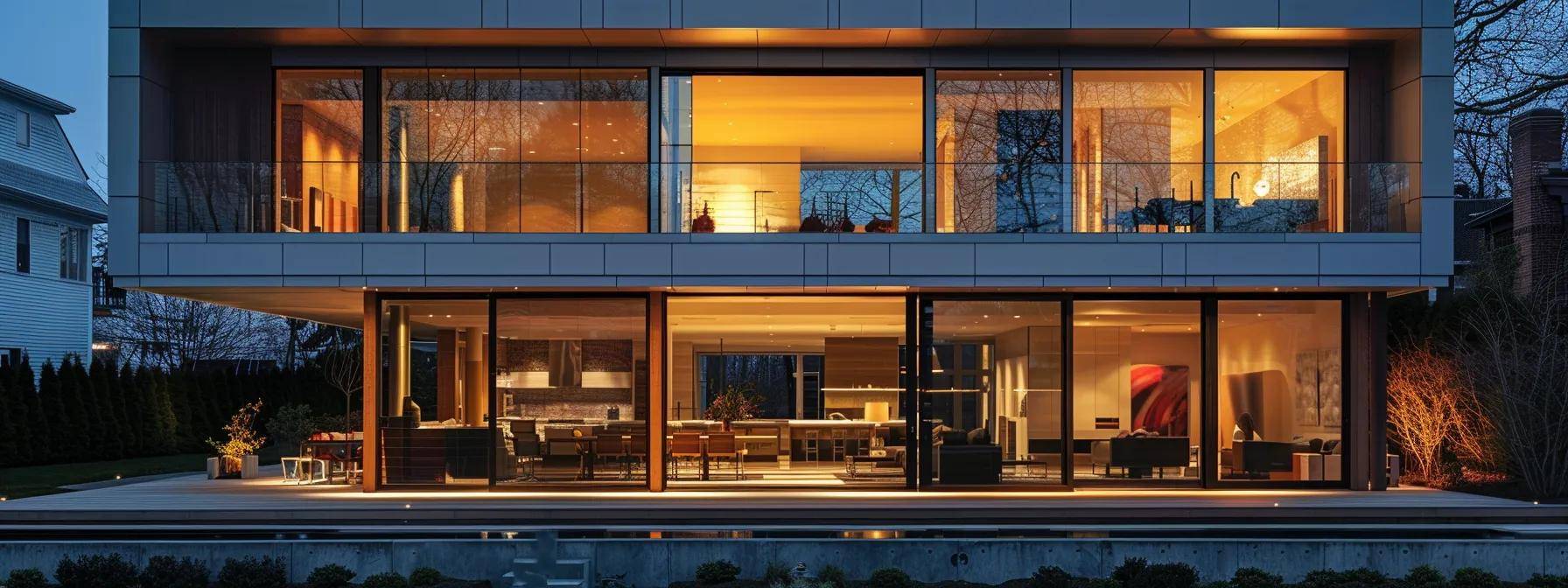
Local environmental factors significantly influence the appropriate choice of window materials for Massachusetts homes. The state’s diverse conditions—from coastal regions to urban and inland areas—present challenges such as high winds, varying precipitation, humidity, and saltwater exposure. These factors can affect a window’s performance, durability, maintenance costs, and aesthetic compatibility.
How Do Massachusetts Winters Affect Window Material Durability?
Massachusetts winters, with extreme cold, heavy snowfall, and frequent freeze-thaw cycles, challenge window durability. Materials must withstand repeated contractions, expansions, and moisture exposure. Vinyl and fiberglass, which exhibit minimal thermal expansion, are well-suited for these stresses, while wood can be vulnerable unless properly maintained. Aluminum requires thermal breaks to prevent condensation and energy loss. Windows designed with robust weatherproofing, such as multi-pane glazing and sealed frames, demonstrate longer lifespans and lower maintenance in severe winter conditions.
What Are the Best Windows for Coastal Areas Like Cape Cod?
Coastal regions, such as Cape Cod, face challenges including high humidity, salt spray, and powerful winds. Here, corrosion resistance and structural integrity are crucial. Fiberglass windows are often preferred for their resistance to salt-induced corrosion and high impact strength, while vinyl windows perform well if properly manufactured. Although wood windows offer excellent aesthetics, they may require more frequent maintenance due to moisture absorption. Specialized weather-resistant coatings and enhanced sealing are recommended for coastal applications.
How Does High Humidity and Rain Impact Window Maintenance?
High humidity and frequent rainfall can lead to moisture infiltration, condensation between glass panes, and mold growth if windows are poorly sealed. Vinyl and fiberglass perform exceptionally well under these conditions due to their moisture resistance. Wood windows require regular upkeep such as staining or painting to prevent mildew, and aluminum windows need proper insulating features to counter condensation. Routine maintenance, including cleaning seals and checking for minor leaks, is essential to keep windows functioning as effective barriers against damp weather.
What Are the Most Common Questions About Window Materials for Massachusetts Weather?
When replacing windows in Massachusetts, homeowners often ask questions about optimal materials, installation timelines, and energy savings of modern windows. The following FAQs address these common inquiries with clear, evidence-based answers relevant to the region’s climatic challenges.
What Is the Best Window Material for Cold Weather in Massachusetts?
Typically, the best material for cold weather combines low thermal conductivity with high durability. Fiberglass and high-quality vinyl stand out: fiberglass for its resistance to temperature fluctuations and vinyl for its effective insulation and cost-efficiency. Both options offer superior energy ratings and robust seals against drafts.
How Long Does Window Replacement Take in Massachusetts?
Window replacement generally takes one to three days, depending on the number of windows, installation complexity, and existing conditions. A professional installer will assess, remove old windows, prepare openings, and secure new windows with proper insulation, flashing, and caulking. Permitting and inspections may add a short delay, but experienced installers can complete the process efficiently with minimal disruption.
Are There Energy-Efficient Window Rebates Available in Massachusetts?
Yes. Energy-efficient window replacements often qualify for rebates and tax credits through programs such as Mass Save, as well as federal and local incentives. These programs help offset the initial costs of high-performance windows that incorporate features like Low-E coatings, argon gas fills, and multi-pane glazing, reducing overall energy consumption.
Frequently Asked Questions
Q: How does choosing the right window material impact overall home energy efficiency in Massachusetts? A: Materials with lower U-Factor and higher R-Value reduce heat loss during winters and minimize heat gain in summer. High-quality options like fiberglass or Energy Star certified vinyl enhance insulation, leading to lower energy bills and improved indoor comfort, especially when combined with features like Low-E glass and argon gas fill.
Q: What factors should be considered when selecting windows for coastal areas in Massachusetts? A: For coastal regions, high corrosion resistance and durability are essential. Fiberglass and specially coated vinyl are recommended due to their resistance to salt spray and moisture. Additionally, proper sealing, weather-resistant flashing, and professional installation help maintain energy efficiency and prevent water intrusion.
Q: Can professional window installation really make a difference in the performance of new windows? A: Absolutely. Professional installation ensures precise measurements, proper sealing, and secure integration with the home’s structure. This minimizes air leaks, enhances insulation, and extends the lifespan of the windows, which is particularly important in Massachusetts’ extreme weather conditions.
Q: How often should Massachusetts homeowners maintain or service their windows to prevent issues from humidity and winter weather? A: Regular maintenance—at least twice a year, ideally in spring and fall—is key. This includes cleaning seals, checking for condensation, and ensuring that caulking and weatherstripping remain intact to prevent drafts, moisture damage, and structural deterioration.
Q: Are there financing options available to help offset the cost of replacing windows with energy-efficient models? A: Yes. Many utility companies and state programs like Mass Save offer rebates, tax credits, and low-interest financing options to help ease the financial burden of upgrading to modern, energy-efficient windows.
| Window Material | Approximate Cost per Window | Lifespan (Years) | Energy Efficiency Highlights | Maintenance Requirements |
|---|---|---|---|---|
| Vinyl | $300 – $800 | 20-30 | Low U-Factor, multi-chamber design | Minimal, occasional cleaning |
| Wood | $600 – $1,200 | 15-25 | Excellent insulation when maintained | High, requires regular painting/staining |
| Fiberglass | $500 – $1,000 | 25-35 | Superior thermal stability, low maintenance | Low, periodic inspection |
| Aluminum | $400 – $900 | 20-30 | Modern designs with thermal break options | Moderate, may require corrosion treatment |
Before making a final decision, Massachusetts homeowners should review the comparison table and assess each material’s cost, durability, energy efficiency, and maintenance requirements. Selecting the right combination for your home can lead to long-term savings and enhanced comfort.
To further illustrate these comparisons, consider that vinyl windows offer a cost-effective solution with minimal upkeep, while fiberglass windows provide long-term durability and impressive energy performance that can justify a higher initial cost. Aluminum windows appeal to those seeking contemporary aesthetics with thermal break options, and wood windows offer unmatched insulation for those willing to invest in regular maintenance.
Ultimately, understanding these cost differentials and operational benefits is crucial for homeowners looking to make a wise long-term investment in window replacement that balances performance with financial feasibility in Massachusetts’ demanding climate.

